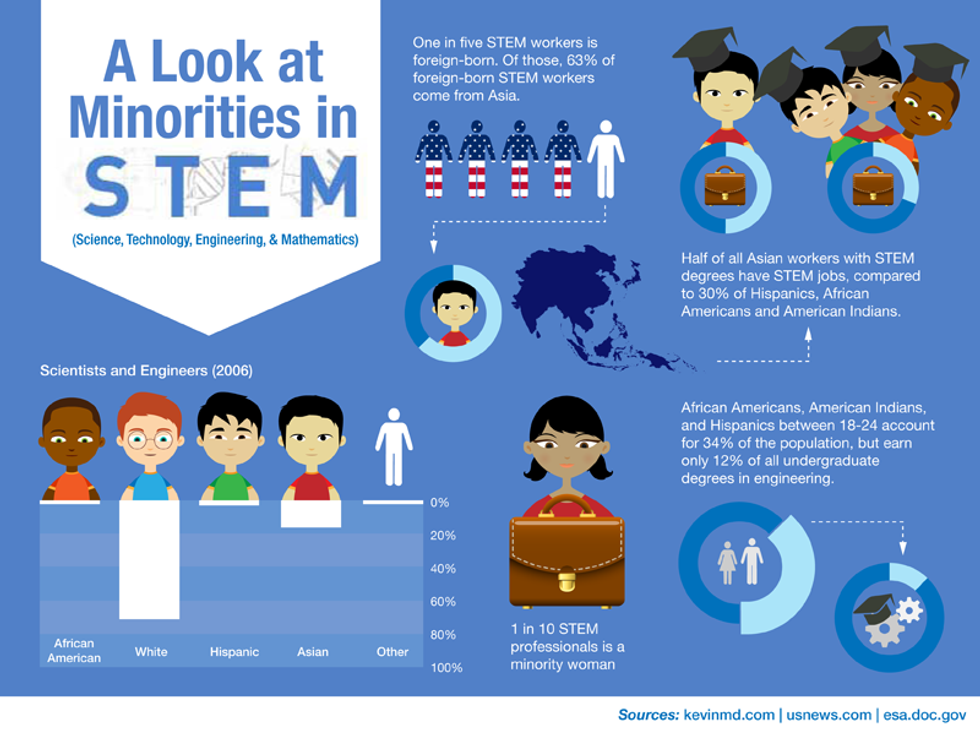America is facing a severe STEM epidemic, and we need to get to the root of the problem. STEM, for those of you who don’t know, is an acronym for Science, Technology, Engineering and Mathematics. The problem America is facing is that the number of qualified STEM applicants has severely decreased, and America's education system is falling farther and farther behind compared to other nations. We used to lead in the STEM field, but now we are 27th place in math and 20th in science in the ranking of 34 countries by the Organization for Economic Cooperation and Development. For 15 years, Republic of Korea (South Korea) held first place for being, on average, the most mathematically and scientifically literate.
A huge part of this problem is that, unlike other nations, we aren’t using all of our resources. In America, most of our STEM graduate students are still male, and either white or Asian -- around 84%, in fact -- when white and Asian men and women make up only 69% of the workforce. With women making up 48% of the workforce, that means half of that 69% is women, with only a quarter of the workers being in the STEM workforce in general. This means not a lot of that 84% is women. Moreover, 29% of the workforce population is black and latinx. That is a severe pool of potential that isn’t even touched upon. Unlike other leading nations, we seem to ignore potential candidates or don't give them opportunities in the STEM field because they are a minority.
But it isn’t like there is a lack of STEM jobs out there. In fact, the STEM job market has grown 28% since 2000, while all other jobs only grew by 6%. With more and more unqualified Americans, STEM employers are starting to look outside our nation to find employees.
Our biggest problem stems from our education system. To begin with, over one third of our high school teachers aren’t qualified to teach the subject matters they are teaching to high school students. There is a 24% drop out rate for latinx individuals, three times the dropout rate for European-Americans, and 12% drop out rate for blacks. When it comes to people of color (POC) who try to aim for a STEM degree in America, only 51% of latinx individuals and 63% of blacks succeed, while 65% of European Americans and 76% of Asian Americans do.
A lot of the reasons blacks and latinx individuals are not succeeding is rooted in fewer resources being available to them. The poverty rate for blacks and latinx individuals is around 25% for both races, compared to only 10% of European Americans, and 15% of “other.” "Other" mostly consists of Asians and almost completely ignores Native North Americans. (I could go on and on about why I have a problem with that label in the study, but we'll save that for another article.) With so many impoverished blacks and latinx -- which implies they attend worse schools -- the opportunities to properly succeed and learn STEM subject matter decreases dramatically. The fact that these people are living in poverty implies that their parents also didn’t have as good education, especially in STEM fields, like European and Asian Americans did. This means all of these people who are missing out on an education don't even have parents who can help them.
Some of you may argue that since Asian Americans are doing so well, other POCs need to catch up, but in many cases, that ignores the wide difference in the immigration of different races to America. Many black families came here as a result of the slave trade, and following their freedom they have to continually deal continually an economic system stacked against them; their families started their freedom in poverty and without an education, and still have to little to no access to it. Also, people with names that don’t sound "white enough" are less likely to be hired or accepted into college. When it comes to finding jobs, it is harder if you are a POC. The main reason Asian Americans like myself are faring better on average is because many Asian American families moved here with a higher education.
My family moved here in my great grandparents’ generation, and they all had doctorates. Even though they moved here because, at the time, America was leading in STEM jobs and Japan had very little opportunity in that field, they still didn’t get a job. No one would hire them, and they had to settle with becoming farmers. Being doctors and not getting a job in the STEM field left them in the mindset that a doctorate just wasn’t enough. So their children had to not only get a doctorate, but be the best students with doctorates, which is why so many of my family members have that degree -- that standard was set early on. (Granted, that’s not so true of my grandparents and their children, as they were the ones who moved to the west coast and were in the internment camps.) Even so, my aunt earned hers, and many of my family members up here are still expected to earn a doctorate. I’ve heard many other Asian American families who have similar stories, which is a very different background from many black and latinx individuals.
America is falling behind in the STEM field. The lack of diversity and failure to tap into such a big part of potential candidates from our population is a huge part of that problem. The major step that needs to be taken is the improvement of our education system, especially for those who live in poverty. Also, many individuals don’t show interest in STEM because the face of STEM is still straight, white, and male. Role models for POCs, women and other minorities need to be represented in the media. Also, the continual work of Women in Science, the development of POCs in science, and the more visible and continual work of Out in Science, a queer science supporting program founded in WWU this year, need to continue to grow and become more widespread.

























